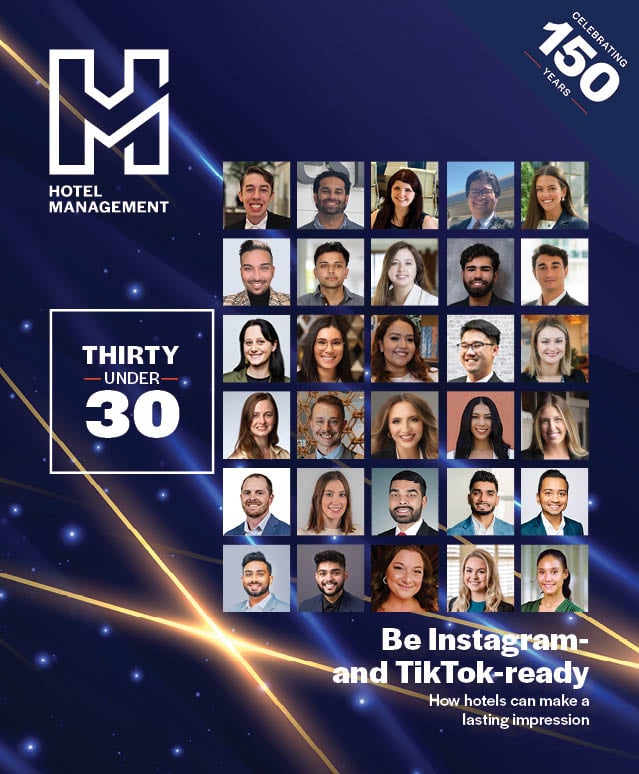BERLIN—Hospitality performance has become dependent on a range of factors that include brand strategy, financial choices, sustainability and geopolitical awareness, delegates heard at a dynamic, audience-led session at IHIF EMEA moderated by Jon Colley, chief strategic growth officer – U.K. & Europe, at Valor Hospitality.
The panel brought together asset managers, owners, operators, and brand representatives to tackle key topics in hospitality performance, with the audience driving the conversation. Hard-hitting questions addressed the themes of emerging India, the legitimacy of key money, the potential impact of U.S. President Donald Trump and whether the hospitality sector is sufficiently focusing on environmental, governance and sustainability goals.
Growing brands
The first question asked what brands needed to do to get noticed for customer growth or corporate takeover, with Elie Younes, executive vice president and global chief development officer, Radisson Hotel Group, responding by saying that “we don’t need to develop more brands at all – there aren’t enough guests for all of them—around six or seven profiles make sense.”
Camil Yazbeck, global chief development officer — premium, midscale and economy, Accor, responded more fully, saying that Accor now had around 47 brands, and that this had been a key part of its strategy “to make sure that we are in all the segments.” He said that for brands to get noticed it was crucial to “chime with the customer,” suggesting that factors like experience, the brand’s DNA and the ability to earn loyalty points might all help. “Guests are looking for a hotel that is connected to the local community, where they can have an authentic experience,” he added. “All of this tells you that there are ways of increasing numbers and getting consumers to the hotel, with the right F&B for example, which should bring more return on equity for investors.”
Ruslan Husry, owner and CEO of HR Group, which has just rebranded as Revo Hospitality Group, also offered his insights. He said that his firm had recently bought the Vienna House brand and sold it to Wyndham, with a view to “franchising it back.” He explained: “We are trying to create the maximum value for each property that we are operating” and noted that the sale of the brand would enable it to “accelerate stronger distribution channels.”
Moderator Colley suggested that firms should focus on the “master brand,” noting: “The sub brands are important, but distribution, loyalty and local positioning is key.”
Key money
Another question raised the validity of key money in building partnerships, with Younes describing it as “a financial instrument to try and support an owner or operator in doing a transaction with you.” He said that their use had increased over the past four or five years and had proved crucial in supporting owners in developing their hotels.
Husry agreed that key money could be “an accelerator for a brand to enter a market,” but that while he was happy to accept such sums, “we would look at how much the brand could distribute in the long term.”
Yazbeck advised industry actors to be wary, and not “choose a brand depending on how much key money they were offering”. He added that it was more important to see if they would bring in the added value of “OTA commissions or extra RevPAR” and that too much key money might sometimes suggest that brand support would fall off after.
When the panel was asked on their views about the impact of Trump’s executive orders on inbound US traveller volumes to Europe, responses were mixed. Husry suggested that it might prove “more positive for Europe from an investment perspective, if more capital comes in for the European hospitality industry,” noting that US traveller volumes were not fully up to speed in Europe compared to long-term metrics in any case.
Climate of uncertainty
Yazbeck said that in a climate of “a lot of uncertainty,” it was worth focusing on broader global trends like demographics and the expansion of mid-market demand and transportation options. He said that diversification was also a good hedge against geopolitical threats, adding: “That’s why we’ve gone into branded residential, own three F&B companies, have co-working, the Accor Live Limitless program, and Accor Arenas.”
Turning to the topic of sustainability, while moderator Colley suggested that the industry was “woeful and very far behind,” other panelists were more upbeat.
Younes said that it was still a high priority for Radisson, noting that the group had “very clear plans for reaching net zero by 2050 and concrete KPIs to get there.” He added that three areas of focus including the sustainability of buildings, of energy and of operations, emphasizing that company policy was also being driven by “customers and stakeholders [who] want that.”
Yazbeck said that it remained “a key priority for Accor” and that the firm had created a “toolbox for owners where you can get quick wins, medium term wins and long-term wins” in areas ranging from quick CapEx fixes to altering the fabric of buildings. “It’s chimed a lot with our owners and they love it,” he confirmed.
A final question touched on the expanding Indian market and if the panelists thought it could ultimately overtake Chinese outbound tourism in terms of volumes. Younes said that his firm has “200 hotels in India” and wants 500 by 2028, describing the market as “on steroids”, and displaying the best fundamentals for development as any market in the world.
Yazbeck added that it was in Accor’s interests to grow in India because “the more hotels we have there, it creates more loyal customers that will utilize the hotels we have in Europe and everywhere else.” Husry concluded by saying that “we like to have our hotels full and believe in all markets,” noting that “the outbound market from India was getting stronger.”
This story originally ran on Hotel Management's sister site Hospitality Investor.

